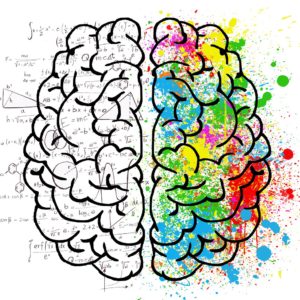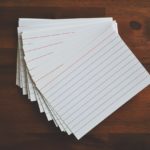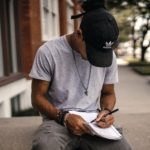Study Skills for Teens & Young Adults

Does this sound like you?
Help! I don’t learn from studying!
My notes don’t help me to study • I get distracted while studying • I get anxious when taking tests • I don’t remember what I have read • I get bored and tired when studying • I am disorganized while studying • It takes me too much time to read and study • My notes are not helpful for studying • I don’t have time to finish tests…

Below are many techniques, resources and videos that can help YOU study in a way that works for you. You might be surprised what you find.
Put the effort into studying, but make it worthwhile. There is some truth in the saying, “Practice makes perfect,” but certain types of practice/studying are far more efficient and effective than others. Learning starts with effort: if you do not put energy and time into doing something, it simply won’t work. But you CAN find a unique way to motivate yourself, then learn how to study in a way that suits your learning style.
1) We suggest you start by asking yourself what you would like to improve (which question above sounds most like you.)
2) Watch at least one video on this page, then…
3) Pick one strategy or brain hack below and give it your all, noting your results.
Favorite this page and come back to add/try another learning strategy in a few days. Utilizing more than one strategy can improve your retention results in seemingly exponential ways. You can trust your instincts about learning styles that suit you best, but always note your results and adjust.
 First, a little background…
First, a little background…
The teenage brain is abuzz with many things, and school is often at the bottom of the heap. It can also be difficult to direct your attention away from a phone and tablet and focus on academics.
APP ALERT! »» While there are ways to put those mobile devices to work for your success rather than against it (you can find some great apps to help improve study skills like Quizlet, Evernote, and Elevate), often high school and college students need to rely upon more traditional study methods. Once you understand how your brain works (at this age), you can utilize learning strategies that work with your natural learning style, even if you’ve been diagnosed with ADHD, ASD, or other learning disability.

Researchers John Dunlosky, Katherine A. Rawson, Elizabeth J. Marsh, Mitchell J. Nathan, and Daniel T. Willingham found the best study methods help you learn and remember.
Their report on their findings is about 50 pages long, so let us break it down for you with some of the best study methods for teens’ academic success.
Are You Ready?!
In short, use proven study methods, especially These Five Learning Strategies
Large studies involving thousands of students have determined specific techniques that are more likely to help you remember what you have studied and apply it effectively in tests and other areas. Here are five methods of studying that have been proven to be effective, with their descriptions. And don’t be put off by their tongue-twisting titles — we’ll explain them.
- Elaborative interrogation– Essentially, you ask the question, “Why?” and attempt to answer this question while you are studying. This type of technique forces the learner to elaborate on their understanding of the facts. Generally it works best when you attempt to find the essential answer very quickly and then, if necessary, find the supporting evidence. This technique may not work as well with very complex systems of information, but it could be the best way for you to recall specific facts or connections among facts.
- Self-explanation– Explain how new information is related to already-known information and enumerate the steps taken to solve a problem. This is a common method for teaching math (where the explanation is often as important as the answer) and it is also how many history texts are written. Self-explanation may work best when you are studying a topic you don’t know much about. To use this technique, provide an explanation while solving each step of a problem; in math you would state why you are performing each operation and what your answer is, and if you were answering a question for history or English, you would explain about some of the previous knowledge you had and how you came to a particular conclusion.
- Practice testing– Basically, quiz yourself. This type of testing does not count as part of a grade in a classroom and could be conducted by yourself, using flashcards, or with study buddies. You could also practice test by looking at questions that are often included at the end of textbook chapters or looking for quizzes that are available on electronic supplements that may accompany your textbook or even going to one of the popular study websites that feature crowd-sourced flashcards and quizzes. Practice can help you mentally organize your information and improve your retention and recall of material.
- Distributed practice– Distributed practice is quite simply the opposite of cramming. This technique is better than an all-night study session before the big exam because the human brain must see something repeatedly over the course of time in order to effectively commit it to memory. Of course, cramming is better than not studying, but studying an hour a day for a week works better. This is because spacing out readings and self-testing means repeatedly needing to recall what you have learned and connect it to other material over the course of time, engaging your long-term memory. Cramming puts your short-term memory to work, reducing the chance that you will understand material and actually add it to your knowledge bank. Maybe you’ll ace that midterm, but you’ll be sorry when you have all that material to try to memorize againfor the final exam.
- Interleaved practice– Mix it up. Practice different kinds of problems or material in a single study session. Maybe you want to study math, but instead of only thinking about geometric areas or algebraic equations, you practice both. You might study history by writing an essay — like you’ve been practicing in English — on a particular chapter of the history text. If you’re trying to expand your vocabulary in a foreign language, you might try putting those vocab words into grammatically correct sentences. Interleaved studying is believed to be so helpful because it presents problems the way they would appear on tests (and in real life). Interleaved practice promotes organizational processing, as it allows you to compare different types of problems and practice different problem-solving methods.
And yet … also be careful how you study. There are study techniques that are widely used but are generally found not to be effective by themselves. These include:

summarization– writing summaries of text to be learned
highlighting and underlining– marking important portions of to-be-learned material while reading
keyword mnemonics– using keywords and mental imagery to associate relevant material
imagery for text– forming mental images of text material while reading or listening
rereading– restudying text material again after initial reading
While each of these may be helpful to some students based upon their learning styles or combined with other methods, they do not appear to be as effective by themselves as other strategies.
Videos
To learn more on how the teen brain works while it’s learning, check out this great video by ASAP Science. They also made this really interesting video about hacking your brain below.

Wait, What?!
I should also have fun to learn?
Because play is an important part of learning, even for older kids and teens, see our recommendations for a developmentally Healthy Play Diet.
Many more study strategies that work: use your senses for improved results
 Study by using flashcards. Flashcards are helpful because users learn to associate an answer with a particular question and can have the cards presented to them in a random order. They also give immediate feedback. Investigate some of the flashcard apps that are available.
Study by using flashcards. Flashcards are helpful because users learn to associate an answer with a particular question and can have the cards presented to them in a random order. They also give immediate feedback. Investigate some of the flashcard apps that are available.
 Say what you want to remember. Instead of typing or writing, use a dictation program on your cell phone for verbally summarizing what you want to recall. Dictation programs enable learners to see what they want to recall. Going back to check dictation and to review notes lets users catch mistakes and forces them to to think more about what they were trying to recall.
Say what you want to remember. Instead of typing or writing, use a dictation program on your cell phone for verbally summarizing what you want to recall. Dictation programs enable learners to see what they want to recall. Going back to check dictation and to review notes lets users catch mistakes and forces them to to think more about what they were trying to recall.
 Learn by teaching others. One of the best strategies for studying is to teach others what you know and to share your information. Reviewing material before teaching it to someone else could help you to know it better than you did before, especially since you would need to explain the information to others in a very clear fashion.
Learn by teaching others. One of the best strategies for studying is to teach others what you know and to share your information. Reviewing material before teaching it to someone else could help you to know it better than you did before, especially since you would need to explain the information to others in a very clear fashion.
 Figure out your learning style and modify your study techniques to fit that style.
Figure out your learning style and modify your study techniques to fit that style.
- Auditory learners who learn by listening and speaking might want to read material out loud, saying it over frequently in order to be able to recall it, or to study with friends so they can hear the material.
- Visual learners might prefer to read or look at material in order to recall it. Reread material, draw pictures, or use your visual memory to help with memory.
- Kinesthetic learners do best by touching and doing things and may learn best when they are moving, perhaps standing while studying or walking around as they try to learn. These learners sometimes like having a ball or something else to play with in their hands and can benefit from rewriting their notes, which can help them to remember more.
 Write down what you need to study. Do not highlight, as highlighting as a tool for studying has generally been demonstrated to be ineffective for improving memory or recall. Writing down what you want to remember can be helpful because of the need to put your thoughts into your own words, and the process of handwriting can be helpful in this regard.
Write down what you need to study. Do not highlight, as highlighting as a tool for studying has generally been demonstrated to be ineffective for improving memory or recall. Writing down what you want to remember can be helpful because of the need to put your thoughts into your own words, and the process of handwriting can be helpful in this regard.
 Summarize what you want to remember by typing it. Instead of handwriting as you are reading, take notes on Google docs or another cloud-based word processing program. This way you can go back and change what you have written or move it around. Typing what you want to remember helps you learn to summarize and figure out what is most important.
Summarize what you want to remember by typing it. Instead of handwriting as you are reading, take notes on Google docs or another cloud-based word processing program. This way you can go back and change what you have written or move it around. Typing what you want to remember helps you learn to summarize and figure out what is most important.
 Learn about a variety of note-taking approaches to improve studying. This is particularly helpful for older students who struggle to keep their notes organized or to write quickly enough to keep up with classroom lectures. Divide a notebook page vertically, with the general topic area on the left side and specific content detailed on the right. Find and summarize the main ideas of the content and then borrow friends’ notes to fill in the gaps. Strategies for note taking can be found in the book Learning Outside the Linesby Jonathan Mooney and David Cole.
Learn about a variety of note-taking approaches to improve studying. This is particularly helpful for older students who struggle to keep their notes organized or to write quickly enough to keep up with classroom lectures. Divide a notebook page vertically, with the general topic area on the left side and specific content detailed on the right. Find and summarize the main ideas of the content and then borrow friends’ notes to fill in the gaps. Strategies for note taking can be found in the book Learning Outside the Linesby Jonathan Mooney and David Cole.
 Improve study skills by recording or “parroting” a lecture to transcribe later into notes with a dictation program. This technique can be a great tool for studying for learners who like to be able to listen to a teacher and then comment on their own notes. It involves initially creating an electronic recording of a lecture with a digital voice recorder that can be transferred to a personal computer. Once the recording is transferred to the computer a dictation software such as Dragon Dictation can create a set of notes from the lecture.
Improve study skills by recording or “parroting” a lecture to transcribe later into notes with a dictation program. This technique can be a great tool for studying for learners who like to be able to listen to a teacher and then comment on their own notes. It involves initially creating an electronic recording of a lecture with a digital voice recorder that can be transferred to a personal computer. Once the recording is transferred to the computer a dictation software such as Dragon Dictation can create a set of notes from the lecture.
Because Dragon Dictation needs to be personalized and additional sounds that may be in the background can distort what is written, users need to employ a technique called “voice writing” or “parroting” parts of the lecture to other recordings. Headphones are used to listen to the recorded lecture, and users can either repeat what they are hearing or modify/translate it into something more meaningful for learning. This technique can also be helpful as part of the process of studying for an exam, as users have to listen to the lecture again, put the lecture into their own words, and think about what is most important, then connect the ideas in the lecture to other knowledge and things they have read.
 Develop a plan for proper rest before important testing. Getting enough sleep can be problematic for many teenagers and young adults but has been linked to improved performance on tests and sports performance. Top athletes such as Tom Brady, Lebron James, and Lindsey Vonn report that sleep is crucial to them being at their peak. Take sleep into your own hands, do not wait for a parental command to go to bed. Because getting enough sleep involves planning, you would need to complete your studying in order to have adequate time for rest.
Develop a plan for proper rest before important testing. Getting enough sleep can be problematic for many teenagers and young adults but has been linked to improved performance on tests and sports performance. Top athletes such as Tom Brady, Lebron James, and Lindsey Vonn report that sleep is crucial to them being at their peak. Take sleep into your own hands, do not wait for a parental command to go to bed. Because getting enough sleep involves planning, you would need to complete your studying in order to have adequate time for rest.
More Articles & Posts That Highlight Innovative Learning Strategies That Work
Traditional study skills are often not very effective for teens and young adults with academic concerns or learning disabilities. Check out these sites that offer some innovative study skills.
Memory Improvements Tips: Comprehensive ideas for improving study skills Get Memory Tips
Tips for Kinesthetic Learners: Study skills for children who learn by moving and touching. Get Tips for Kinesthetic Learners
Improve Writing Skills: Helpful and simple writing strategies for middle school and high school students. Improve My Writing Skills
Basic dictation competency requires mastery of the apps (knowing how to talk and edit); the use of dictation to generate lists, ideas, and notes; and the ability to use dictation as a tool for written expression that transforms speech from a conversational mode to include written expression, complete sentences, and organization of thoughts. Learn more about how to dictate through This Video
More Videos & Other Great Study Ideas
Watch online videos for more information on academic and study skills. These videos contain entertaining content, as well as practical information to help improve academic and study skills:
Brain Music: Provides music for increased concentration, suitable for middle school and high school students.
How to Study Effectively
This is a video for teenagers and young adults on various study skills that relate to focus and time management.
Watch YouTube videos to improve academic knowledge
Watch YouTube videos on topics you are covering in school in areas such as history, biology, the environment, nature, politics, and social studies. Resources in this regard can be found at 12 Best YouTube Channels for Kids and Teens.

Use vigorous physical exercise as a tool for homework completion
Take a 5- to 10-minute exercise break in between lengthy assignments. Do not watch television or play video games during these times but do something physical such as running around the house, doing a set of push-ups or sit-ups, running up and down the stairs, or taking the dog out for a short walk. Exercise increases the production of a brain protein that improves focus and learning.
Record a lecture and then transcribe it
Turn your recording into notes with a dictation program. One of the best techniques for studying is to ask questions and comment on or connect what one had learned to something else. While this study strategy can be a bit complicated, it can be a great way to make teenagers and young adults think about a teacher’s lecture.
APP ALERT! »» Create an electronic recording of the lecture that can be transferred to a personal computer using a digital voice recorder, a computer that records, or an app such as Notability. Once the recording is transferred to the computer, use dictation software such as Dragon Dictation to make a set of notes from the lecture, then listen to the recorded lecture and use your dictation software to make your commentary.
This is essentially taking notes on your notes, but instead of relying upon written material, you are listening to the lecture again and making your notes by talking into a dictation app. This technique can also be very helpful as part of the process of studying for an exam because it forces learners to listen to the lecture again and put the teacher’s lecture into their own words. It also requires thinking about what is most important and connecting the ideas in the lecture to other knowledge and things they already know.
Review (not study) new material before sleep
This may enhance recall. Studies have demonstrated that reading over material 15 minutes prior to going to sleep allows the brain time to absorb the information and increases recall of that information the next day. Other studies, however, caution that associating the bed with more intense studying can interfere with the sleep necessary to think the next day. Therefore, reserve the 15 minutes prior to sleep to preview material previously studied, not for learning new material. Go to this article for the research.
Space studying for a test over days or weeks.
“Cramming” the night before a test can increase anxiety and interfere with clear thinking. Study for a test over a longer period of time to enhance long-term memory and real learning. Several studies support spaced-out studying for deeper learning of material. Check out this article for more information.
Learn test-taking techniques
Strategies such as how to use time more efficiently and strategically by previewing a test before starting it can be very powerful. Understanding how a test is structured can help determine how best to use the allotted time. Read the directions carefully when the teacher hands out a test and ask the teacher to explain anything you do not understand. Look quickly at the entire examination to see what types of questions are included (multiple choice, matching, true/false, essay) and, if noted, the number of points for each. This can help with your pacing during the exam. Skip questions to which you do not know the answer and return to them later.
Have Questions? Contact Us